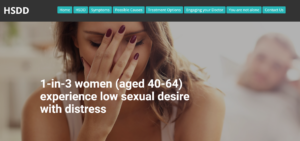What is HSDD?
What is HSDD?
Hypoactive sexual desire dysfunction (HSDD) is an extremely common medical condition that causes distress resulting from a low sexual desire.
Clinical data indicates that 7 in 10 women (aged 40-64) presented with low sexual desire, and 1 in 3 women (aged 40-64) reported low desire with distress (HSDD)2.
Engaging your Doctor
We understand that this maybe a sensitive subject. Many women feel discomfort or embarrassment which contributes to their unwillingness to seek treatment (only 20% of women with HSDD actively consult with their doctor).
In order to facilitate discussing this subject with your physician please download and answer the Screener Questionnaire and present it to your doctor.
HSDD Screener
Doctors who are members of the Australasian Menopause Society (AMS) have a special interest in women’s health in midlife and menopause, and the promotion of healthy ageing.
To help you find a doctor who is right for you the AMS search feature Find an AMS doctor may be useful.
Latest News
 AUSTRALIAN MINNOW, LAWLEY PHARMACEUTICALS, TAKES PBAC TO FEDERAL COURT
AUSTRALIAN MINNOW, LAWLEY PHARMACEUTICALS, TAKES PBAC TO FEDERAL COURT
MEDIA RELEASE – Wed 11 February 2026 AUSTRALIAN MINNOW, LAWLEY PHARMACEUTICALS, TAKES PBAC TO FEDERAL COURT A small Perth-based pharmaceutical company is stepping up… Continue Reading →
 PBAC says NO!
PBAC says NO!
The outcome of the November 2025 meeting of the Pharmaceuticals Benefits Advisory Committee (PBAC) has determined that AndroFeme® 1 testosterone cream for the treatment… Continue Reading →





